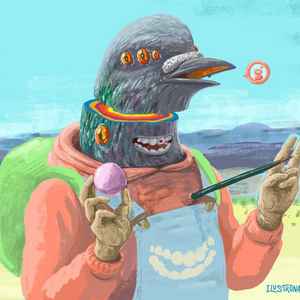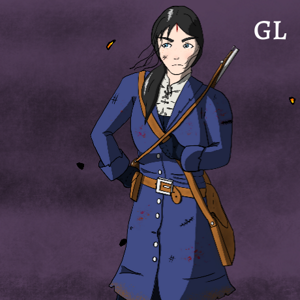Chapter One: Slim Pickings
‘I tell you now, sir, have you ever seen something possessing such grandiosity? The Kingdom of Forsara has stood for over three millennia, the line of Forsar unbroken to his Imperial Majesty Kristoff IV, king of this land and its colonies by the will of generous gods. It has stood unbent and unbowed through war after war and has but grown stronger for the march of the years, not suffering the decline seen by Jodlund or Icceria. I ask you then, honourable gentlemen, to reconsider your ill-advised declaration. If Forsara can survive for three millennia then who are you to say it cannot survive for three more?’
Ambassador Jurg av Lounsen of Forsara to his counterpart in Magnara, circa 3011 S.F.
33rd day of Ascending Rains, 3042 S.F. - Three years since The End of All Things.
Silent as a ghost, water parted for timber that had not seen a careen in over a year, crusted with barnacles and other creatures of Njall’s domain but nevertheless hale and tight as the day they were lain down. With a wet slither, ropes were cast out to fall on the stone wharf, followed by the lightest of leaps from ten pairs of boots. Knots were tied quickly and efficiently, expertly designed for quick release in a hurry, and orders were rapidly whispered.
‘Goose and his team will head south to the blockhouse then press further inland on a general hunt. Scops and her team will get to the drydock and load up there before doing the same. Remember, we are running low on shot and powder so conserve what you have and grab any you find. You have an hour before the mist clears. You have your maps, may Harnir give you strength. Go!’
The pre-dawn sea mist was a hindrance to navigation and seamanship but a boon to the shore teams. The cloying swirls hid them from sight of any that might be watching, man or beast or elf, and let them be about their business. It usually lasted for only an hour before the sun rose and burnt away the vapours, revealing the land like a shroud had been removed.
Breathing measured and careful, straps and buckles dulled by blackening and deadened by wrapped cloth, Sparrow ran lightly after the big man known as Goose. The squad leader had once been a veteran marine, bound with muscle, grey of hair, and cool of temperament, proving to be a natural commander and mentor. Off to her left, the young mage known as Peacock kept pace, brow furrowed as he maintained a telepathic link to his counterparts in the other squad and on the ship.
To her right darted the lithe form of Grouse, her copper hair bound loosely in braids interwoven with ribbons, beads, and feathers, with Hawk following at the rear. She knew his eyes would spend as much time on the backsides of the two ladies as they would on the mists but there was not an awful lot to be done about it. There were more important things to worry about and at least he kept his hands to himself.
Sparrow clutched in one hand a sheet of waxed paper, the map drawn upon it a near-enough copy of that of the seaport town of Viocoumen. She was in charge of the map today. She was in charge of the map every day, but the key to success was playing on peoples’ strengths. Goose was the leader, Peacock’s talents were obvious, Grouse had good eyes, and Hawk could fight more dirty, vicious, and effectively than anyone she had ever seen. Her strengths lay in knowledge. On every expedition she tried to bring back a new book or scroll or other repository of wisdom. The things she had committed to memory of the old world had served the crew well over the years, finding the best places to scavenge for supplies, agricultural manuals, or even old stories to make the long days slightly more bearable.
Viocoumen’s dockyards were small, designed to handle minor mercantile and fishing endeavours, overshadowed by the more sheltered anchorage of Nasuut further up the coast, and so it only took them a few minutes of silent running, weaving around rubble, to reach the stout perimeter wall of the blockhouse. Only a token complement of marines would have been garrisoned there, to enforce customs, deter pirates and the like, but even a single unit would require precious reserves of shot, powder, and arms.
‘Ware th’ fore,’ Goose hissed.
The group slowed down to a walk and raised their weapons. Goose had a brace of four pistols across his chest, Grouse a musket with a wicked-sharp bayonet on its ring, and Hawk a pair of notched naval cutlasses. Sparrow preferred the carbine, giving a middle ground between the manoeuvrability of the pistol and reach of the musket, backed up by a hatchet in her belt loop. She had found cause enough to use both over the years.
The blockhouse’s small courtyard was protected by a high wall of cut stone topped with irons spikes and its iron-banded oak gates were thrown open, the bulk of the building looming menacingly through the mist not ten yards distant.
Goose looked expectantly to Peacock, the dandy mage’s delicate face tense with concentration.
‘Not a peep, sir,’ the young man replied at a whisper.
‘Easy does it then.’
The coast determined clear by the mage’s extra-normal senses, the group moved forwards at a slow walk, taking care to listen for any betraying sounds. In the years since the End of All Things, the few surviving magi had become an invaluable asset to any band of survivors. For some reason the monsters – dubbed “Frekir” after mythical beasts of old – shone like beacons to one who was properly-attuned to such things. Unfortunately, the range was limited by the power of the mage in question, Peacock himself only boasting a dozen yards, but was nevertheless a life-saving ability.
Another quirk that had been noticed since the fall of civilisation was that the Frekir had the needs of common beasts. New into this world and with a fresh source of prey, they had gorged themselves on the human meat, practically pushing the species to the edge of extinction, but once this became less available they turned to animals, and when they too had fled or been eaten, starvation and infighting had taken its toll; there were far fewer Frekir than three years ago, for which Sparrow often gave thanks. Alas, those that had survived tended to be the smarter or most brutish of the lot.
Pulling her mind back to the now, she began to notice the spread of debris across the courtyard consisting of roofing tiles, shattered timbers and the like. With a sinking feeling she began to realise what they would find.













Comments (5)
See all